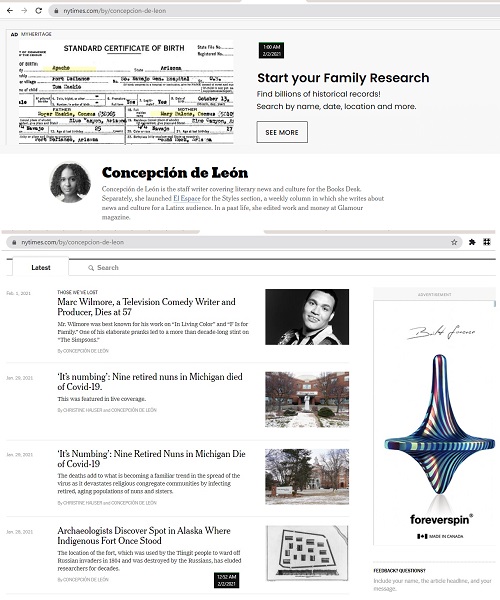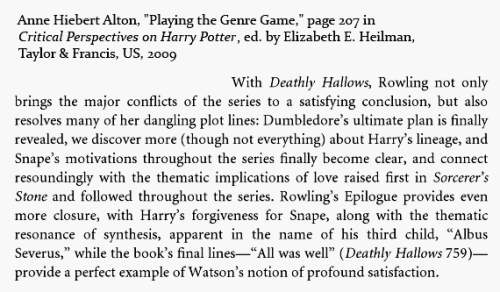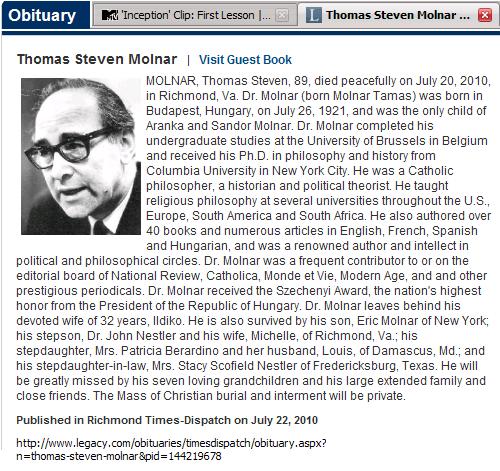Click to enlarge the author page below.
Tuesday, February 2, 2021
Immaculate Inception
Tuesday, August 20, 2019
Inception
"The inception of critical thought, of a philosophic
anthropology, is contained in the archaic Greek definition
of man as a 'language-animal'…."
— George Steiner, Real Presences
A schoolgirl in 1961 —

"Non, rien de rien…"
— Edith Piaf
"I get a kick though it's clear to see,
You obviously don't adore me."
— Cole Porter
Thursday, April 19, 2018
Inception
Peter Woit in his weblog today —
|
"Keating’s book is very much in the tradition of Watson’s The Double Helix, giving a portrayal of himself and others that doesn’t leave out the very human aspects of ambition, competitiveness and jealousy. Unlike the Watson book, which is about a great scientific achievement, the unusual aspect of Keating’s story is that what he was involved in was not a success, but the biggest fiasco in the history of his field. On March 17th, 2014, the New York Times reported on its front page that Space Ripples Reveal Inflation’s Smoking Gun, and this same story was reported by most media outlets." |
This weblog on that date, St. Patrick's Day 2014 —
The New York Times front page story linked to above —

Monday, April 20, 2015
Immaculate Inception
Continued from a post of April 10, 2015 —

Maya Angelou stamp with
misattributed quote and
Oprah on April 7, 2015
Trailer for "Welcome to Me" published on Feb. 23, 2015 —
Related material: Manifest O (April 1, 2015).
Friday, April 10, 2015
Immaculate Inception
See also Midnight Purple
and today's previous post.
Friday, October 4, 2013
Inceptions
Sunday, January 9, 2011
Inception
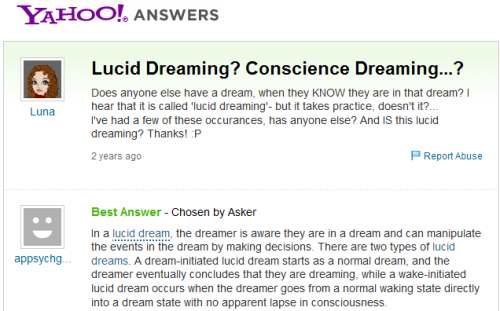
"… a wake-initiated lucid dream occurs when the dreamer goes from a normal
waking state directly into a dream state with no apparent lapse in consciousness."
Not necessarily a good idea.
"Show me all the blueprints."
– Leonardo DiCaprio in "The Aviator" (2004)

Saturday, August 7, 2010
Camp Inception
With a nod to Larry Doyle's "Sleeper Camp"—
From the Mathcamp Reunion Schedule for Saturday, July 24, 2010—
2:30-3:30 PM — John Conway Colloquium
3:30-5:30 PM — Relays: Heaven, Hell, and Purgatory!
In this journal on Saturday, July 24—
Playing with Blocks (noon) and The Leonardo Code (1 PM).

A happy Mathcamper defines Heaven, Hell, and Purgatory—
…Heaven and Hell relays. your team starts in hell, when you get one right, one person can go to heaven and work on heaven questions, but first they have to pass through purgatory. aka this means entertain the people running purgatory. for me this meant dancing in the middle of the gym. i danced and sung the YMCA, which they deemed sufficient (thankfully).
— Imaginary Thoughts and Irrational Ideas weblog
Note in the Mathcamp schedule the Friday night Shabbat dinner and the religious activity on Sunday— a "mini-puzzle hunt."
Monday, August 22, 2022
Tokens/Totems
See Ballet Blanc and Black Art in this journal.
From the former:
"A blank underlies the trials of device."
— Wallace Stevens
From the latter:
Saturday, May 28, 2022
Grothendieck at Chapman …
Last two days of the conference, May 27 and 28, 2022 —
|
27th Friday
9:00 – 10:00 Andrés Villaveces (Univ. Nacional de Colombia):
10:00 – 11:00 Olivia Caramello (Univ. of Insubria; by Zoom): 1:00 – 11:15 Coffee Break
1:15 – 12:15 Mike Shulman (Univ. of San Diego):
12:15 – 1:15 José Gil-Ferez (Chapman Univ.) 1:15 – 2:30 Lunch
2:30 – 3:30 Oumar Wone (Chapman) :
3:30 – 4:30 Claudio Bartocci (Univ. of Genova):
4:30 – 5:30 Christian Houzel (IUFM de Paris): 28th Saturday
9:00 – 10:00 Silvio Ghilardi (Univ. degli Studi, Milano):
10:00 – 11:00 Matteo Viale (Univ. of Turin; by zoom): 11:00 – 11:15 Coffee Break
11:15 – 12:15 Benjamin Collas (RIMS, Kyoto Univ.):
12:15 – 1:15 Closing: general discussion |
Friday, November 26, 2021
DOM
The title can mean the protagonist of the classic film "Inception"
or Document Object Model or Dirty Old Man. Related material:
Click the above image for related material.
Tuesday, May 4, 2021
Annals of Advertising: May Tag
Eames in Inception , about planting an idea—
“It’s not just about depth.
You need the simplest version of the idea,
the one that will grow naturally
in the subject’s mind.
It’s a very subtle art.”
The above quote is from this journal on Jan. 9, 2014,
a date suggested by the New York Times business section:

“Always with a little humor.” — Dr. Yen Lo

Friday, August 23, 2019
Thursday, August 22, 2019
Real Presences
The "Real Presences" title is from the Aug. 20 post "Inception."
See also the real presences in a recent book by J. D. Vance —
"Mom was, everyone told me, the smartest person
they knew. And I believed it. She was definitely the
smartest person I knew."
— Vance, J. D., Hillbilly Elegy (pp. 65-66).
Harper Paperbacks. Kindle Edition.
And not so real . . .
Saturday, January 12, 2019
Friday, July 14, 2017
Black Art
A search for posts in this journal on the actress Ellen Page
in the film "Inception" was suggested by Bastille Day (today),
by her character's name, Ariadne, and by the concluding image
of the previous post —
 .
.
That search yielded the following image …
… which in turn suggests a "loop" back to this date last year —
The New York Times seems to prefer another sort of black art.
A 9 AM illustration from the Times Wire this morning is a misleading
attempt at humor that links to a very dark poem —
Saturday, April 1, 2017
ART WARS Koan*
“Show me all the blueprints.”
— Howard Hughes, according to Hollywood
From an old Dick Tracy strip —
This journal in April 2006 —
Cleaning out her studio, Oslo artist Josefine Lyche
has found some frames from an old art-school audition video —
(Click to enlarge.)
* Search for "st.+peter"+eve+adam+"first+words"
Friday, March 31, 2017
Women’s History Month
Thursday, March 16, 2017
Iacta Est
"Though realism is excellent rhetoric, maybe the best,
in a purely technical or instrumental sense,
that cannot be an adequate reason to accept it
as a serious intellectual position. In its tropes of
Death and Furniture we see a rhetoric that refuses
to acknowledge its own existence; a politics that
can claim a critical-radical credibility only by
the selective use of its opponents' analytic tools;
and a theology which is deeply conservative and
seeks nothing less than the death of disruptive,
disturbing inquiry. While tedium, good taste, political
and moral sensibility will properly determine what
sorts of given realities are thought worthy of inquiry,
those considerations are no grounds for promoting
a realist ontology for social science, nor any other
science, nor for rejecting relativism. On the contrary,
relativism is social science par excellence . . . ."
Loughborough University
— Edwards, D., Ashmore, M., and Potter, J. (1995),
"Death and furniture: The rhetoric, politics and theology
of bottom line arguments against relativism,"
History of the Human Sciences , 8, 25-49.
Related material:
Platonic realism in this journal, yesterday's post Ripples, and …
Gravity's Shadow , 2004 —
Gravity's Ghost , 2010 —
See also an "Inception"-related object —
Saturday, September 24, 2016
Core Structure
For the director of "Interstellar" and "Inception" —
At the core of the 4x4x4 cube is …

Cover modified.
Tuesday, February 2, 2016
Depth Haiku
From yesterday's 2 PM post —
From "Inception" —
Paraphrase of remarks by "Inception" director Christopher Nolan
at Princeton on June 1, 2015 —
"If you have built castles in the air,
your work need not be lost;
that is where they should be.
Now put the foundations under them.”
— Henry David Thoreau
Sunday, March 9, 2014
At Play in the Fields of Brazil
From Facebook, a photo from the Feast of St. Francis, 2013:
Neantro Saavedra-Rivano, author of the 1976 paper “Finite
Geometries in the Theory of Theta Characteristics,” in Brasilia—
On the same date, art from Inception and from Diamonds Studio
in Brazil —
Thursday, January 9, 2014
Depth Psychology
Suggested, in part, by a Jan. 8 post of David Justice—

Eames in Inception , about planting an idea—
“It’s not just about depth.
You need the simplest version of the idea,
the one that will grow naturally
in the subject’s mind.
It’s a very subtle art.”
Sunday, September 15, 2013
Sermon
Suggested by a poem in the current New Yorker.
Today's text —
"We have no more beginnings.
Incipit : that proud Latin word
which signals the start
survives in our dusty 'inception'."
— George Steiner, beginning of
Grammars of Creation
Reply in the Latin tradition—
Cast
(From the Log24 posts
of August 23-24, 2013)
Sunday, June 2, 2013
Zero Theorem
Sunday, December 30, 2012
The Kick
George Steiner, Real Presences , first published in 1989—
The inception of critical thought, of a philosophic anthropology,
is contained in the archaic Greek definition of man as a
'language-animal'….
Richard Powers, The Gold Bug Variations , first published in 1991—
Botkin, whatever her gifts as a conversationist, is almost as old
as the rediscovery of Mendel. The other extreme in age,
Joe Lovering, beat a time-honored path out of pure math
into muddy population statistics. Ressler has seen the guy
potting about in the lab, although exactly what the excitable kid
does is anybody's guess. He looks decidedly gumfooted holding
any equipment more corporeal than a chi-square. Stuart takes
him to the Y for lunch, part of a court-your-resources campaign.
He has the sub, Levering the congealed mac and cheese.
Hardly are they seated when Joe whips out a napkin and begins
sketching proofs. He argues that the genetic code, as an
algorithmic formal system, is subject to Gödel's Incompleteness
Theorem. "That would mean the symbolic language of the code
can't be both consistent and complete. Wouldn't that be a kick
in the head?"
Kid talk, competitive showing off, intellectual fantasy.
But Ressler knows what Joe is driving at. He's toyed with similar
ideas, cast in less abstruse terms. We are the by-product of the
mechanism in there. So it must be more ingenious than us.
Anything complex enough to create consciousness may be too
complex for consciousness to understand. Yet the ultimate paradox
is Lovering, crouched over his table napkin, using proofs to
demonstrate proof's limits. Lovering laughs off recursion and takes
up another tack: the key is to find some formal symmetry folded
in this four-base chaos. Stuart distrusts this approach even more.
He picks up the tab for their two untouched lunches, thanking
Lovering politely for the insight.
Edith Piaf—
See last midnight's post and Theme and Variations.
"The key is to find some formal symmetry…."
Thursday, December 27, 2012
Cast
Note that the visible faces of the die, in counter -clockwise
order, are 3 6 5. See also this journal 365 days ago and,
since 2012 is a leap year, also today's date last year.
Thursday, December 20, 2012
Saturday, March 31, 2012
The Kick
"The inception of critical thought, of a philosophic anthropology, is contained in the archaic Greek definition of man as a 'language-animal'…."
— George Steiner, Real Presences , U. of Chicago Press, 1991, p. 89 (See also Steiner on Language.)
"To some, Inception is a film about the creative process, specifically filmmaking, with Cobb as the director, Saito the producer, Ariadne the screenwriter, Eames the actor, and so on. To others the entire movie is a dream in that the film supports Carl Jungs' dream analysis; with all of the supporting characters acting as classical archetypes to Cobb's multiple personalities (which would also justify the lack of development in the supporting characters). The fact that Inception , in the few months since its initial release, has already given rise to so much discussion and critical thought is much more revelatory than whether or not Cobb is still dreaming."
— Russell Espinosa at FilmFracture.com, Jan. 1, 2011
See also Piaf's "Rien de Rien " in a Log24 post from Jan. 19, 2012.
Friday, March 30, 2012
Steiner on Language
March 28 review in the Times Literary Supplement of
George Steiner's new book The Poetry of Thought—
"If this new book opens with the concession that
language has neither the performative power of music
nor the elegant precision of mathematics,
it is language, for Steiner, that defines the human.
The survey accordingly begins from the ancient Greek
view of man as the 'language-animal.'"
A check of this phrase yields, in a 1969 Steiner essay,
"The Language Animal," a Greek form of the phrase—
In short, the least inadequate definition we can arrive at
of the genus homo , the definition that fully distinguishes
him from all neighbouring life-forms, is this:
man is a zoon phonanta , a language-animal.
— p. 10 in Encounter , August 1969 (essay on pp. 7-23)
After introducing "language-animal" as a translation of "zoon phonanta " in 1969,
Steiner in later writing went on to attribute this phrase to the ancient Greeks.
"The inception of critical thought, of a philosophic anthropology,
is contained in the archaic Greek definition of man as a
'language-animal'…."
— George Steiner, Real Presences , U. of Chicago Press, 1991, p. 89
"… the 'language-animal' we have been since ancient Greece
so designated us…. "
— George Steiner, Grammars of Creation , Yale U. Press, 2002, p. 265
Despite this, there seems to be no evidence for use of this phrase
by the ancient Greeks.
A Google search today for zoon phonanta (ζῷον φωνᾶντα)—

There are also no results from searches for the similar phrases
"ζωον φωναντα," "ζωον φωνᾶντα," and "ζῷον φωναντα."
Monday, March 26, 2012
Smackdown!
(The title is a nod to Peter Woit's recent post "Nothingness Smackdown.")
"To wrestle new mediums to the mat of specificity has been a preoccupation of mine since the inception of October , the magazine I founded in 1976 with Annette Michelson, the first issue of which carried my essay 'Video and Narcissism' which attempts to tie the essence of video to the spectacular nature of mirrors."
— Rosalind Krauss, 2008, introduction to Perpetual Inventory (MIT Press, 2010)
Related material— The video art and mirror art of Josefine Lyche.
See also Krauss's essay on video in Perpetual Inventory— "Video: The Aesthetics of Narcissism" (first published as "Video and Narcissism," October , no. 1 (Spring 1976))—
"In The Language of the Self , Lacan begins by characterizing the space of the therapeutic transaction as an extraordinary void created by the silence of the analyst. Into this void the patient projects the monologue of his own recitation, which Lacan calls 'the monumental construct of his narcissism.'"
— and related remarks on October and the void quoted here March 10 in "Boo Boo Boo."
Friday, September 23, 2011
Times Square Church
Monday, June 6, 2011
The Way of Grace
Dreamtime
"…we're presented with the dream within the dream within the dream…."
— Remark on "Inception" in a review of Malick's "The Tree of Life"
The Way of Nature
Singer/songwriter/musician Andrew Gold died on Friday, June 3, reportedly in the early morning.
The Way of Grace
"They've heard lonely songs they thought were the livin' end."
— Reviewer's parody of James Taylor's "Fire and Rain"
printed in the Spokane Chronicle on May 28, 1991—
the Feast of St. Germain—
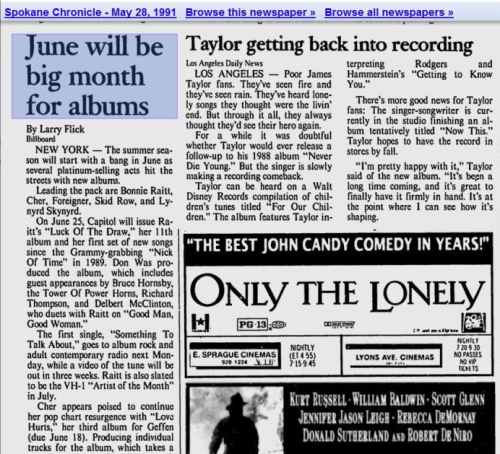
See also First Class, from the day of Gold's death, as well as the later
Midnight and Paris and Mystery.
Background— The above 1991 story about Taylor mentions his interpretation of
"Getting to Know You," from "The King and I." Gold's mother, Marni Nixon, was
the singing voice of Deborah Kerr in the film of that musical.
“It's a very ancient saying, but a true and honest thought…."
Monday, May 9, 2011
May Tricks
"I was bewitched by stained glass, bewitched by cathedrals"
There are worse things to be bewitched by.
A story on stained-glass windows dated April 28, 2008, in The Washington Post mentions—
"the grand gestures of LeCompte's artistry and the small touches, such as the spinning-top-size crystal that LeCompte sneaked into the magnificent West Rose"
From this journal on May 7—
Saturday, May 7, 2011
Turn, Turn, Turn

Saturday, May 7, 2011
Turn, Turn, Turn

Cocktail Party Physics yesterday— "Desperately Seeking Sonya"
Related material: Kovalevskaya's Top and Roger Cooke's
The Mathematics of Sonya Kovalevskaya.
See also "Math class is tough, Barbie."
Sunday, May 1, 2011
Quarantine Story
A link in the previous post to Delos in this journal mentions physicist John Cramer.
His daughter Kathryn's weblog mentions the following story—
Graffiti in the Library of Babel • David Langford
—from her forthcoming anthology Year's Best SF 16 .
From the Langford story—
"'I suppose we have a sort of duty…' Out of the corner of her eye Ceri saw her notes window change. She hadn't touched the keyboard or mouse. Just before the flatscreen went black and flickered into a reboot sequence, she saw the coloured tags where no tags had been before. In her own notes. Surrounding the copied words 'quarantine regulations.'"
Related material from this journal last Jan. 9 —
"Show me all the blueprints."
– Leonardo DiCaprio in "The Aviator" (2004)

DiCaprio in "Inception"
In the "blueprints" link above, DiCaprio's spelling of "Q-U-A-R-A-N-T-I-N-E" is of particular interest.
See also a search for Inception in this journal.
A post on a spelling bee at the end of that search quotes an essay on Walter Benjamin—
This blissful state between the world and its creator as expressed in Adamic language has its end, of course, in the Fall. The “ignorance” introduced into the world that ultimately drives our melancholic state of acedia has its inception with the Fall away from the edenic union that joins God’s plan to the immediacy of the material world. What ensues, says Benjamin, is an overabundance of conventional languages, a prattle of meanings now localized hence arbitrary. A former connection to a defining origin has been lost; and an overdetermined, plethoric state of melancholia forms. Over-determination stems from over-naming. “Things have no proper names except in God. . . . In the language of men, however, they are overnamed.” Overnaming becomes “the linguistic being of melancholy.”7
7 Walter Benjamin, “On Language as Such and On the Languages of Man,” Edmund Jephcott, tr., Walter Benjamin , Selected Writings , Volume I: 1913-1926 , Marcus Bullock and Michael W. Jennings, eds., Cambridge, MA, Harvard University Press, 1997, p. 73.
Compare and contrast with a remark by a translator mentioned here previously —
I fancy, myself, that this self-consciousness about translation dates approximately from the same time as man's self-consciousness about language itself. Genesis tells us that Adam named all the animals (just as in Indian tradition the monkey-god Hanuman invented grammar by naming all the plants in the Garden of Illo Tempore). No doubts, no self-consciousness: "Whatever Adam called every living creature, that was the name thereof." (Genesis II, 19). But after the expulsion from Paradise I see Adam doubting the moment the possibility occurs that another name might be possible. And isn't that what all translators are? Proposers, in another language, of another name ?
— Helen Lane in Translation Review , Vol. 5, 1980
Tuesday, March 1, 2011
Ariadne’s Clue
Related symbolism from Plato’s Cave—
Recall that Ariadne in “Inception” is played by Ellen Page .

“Show me all the blueprints.”
— Howard Hughes, according to Hollywood
Wednesday, February 23, 2011
In Nomine Patris
In memory of Pete Postlethwaite, who played father figures in
"In the Name of the Father" and in "Inception."
He died on January 2, 2011.
"And I looked and behold: a pale horse" — Johnny Cash
This journal on the day of Postlethwaite's death—

For somewhat deeper discussions see "Blackburn+universals" in this journal.
"It is arguable that this is always the deepest, most profound problem of philosophy.”
– Simon Blackburn, Think (Oxford, 1999)
Sunday, January 9, 2011
Sermon
Another topic from today's newspaper —
Commentary —
"We're gonna need more holy water." — "Season of the Witch," a film that opened Friday
See also —
This morning's post Inception and the following site:
Note the ninefold favicon at the above site. Some background—
The Ninth Gate in yesterday's post and this image from last September—
![]()
Monday, August 9, 2010
Angels in the Architecture (continued)
Tonight's lead obituary in The New York Times—
"Patricia Neal, the molasses-voiced actress who won an Academy Award and a Tony but whose life alternated surreally between triumph and tragedy, died at her home in Edgartown, Mass., on Sunday. She was 84 and lived in Manhattan and Martha’s Vineyard."
Related philosophical remark—
…Heaven and Hell relays— Your team starts in Hell. When you get one right, one person can go to Heaven and work on Heaven questions, but first they have to pass through Purgatory. (This means entertain the people running Purgatory.)
– Adapted from Imaginary Thoughts and Irrational Ideas weblog. (See Camp Inception.)
Related entertainment—

Monday, July 26, 2010
A Dream for Molnar
Saturday, July 24, 2010
The Leonardo Code
"If you’re the kind of geek who yearns for detailed schematics
of the technology behind all of this, you’ll be disappointed—
there are none."
— "7 Reasons Why Techies Love 'Inception'," by John Hagel
"Show me all the blueprints"
— Leonardo DiCaprio in "The Aviator" (2004)


Tuesday, July 20, 2010
Dream Names
The protagonist of the new film Inception is named Dom Cobb.
The name Dom may come from "Dominic." (I have not yet seen the film.)
If it does not, see Wiktionary for other possible meanings.
(See also the 1958 Polish short film "Dom.")
The name "Cobb" may have come from a previous film, Following,
by Inception director Christopher Nolan.
My own preference is for Rachel Cobb.
Friday, June 2, 2006
Friday June 2, 2006
to win American spelling bee
Weltschmerz
and the
Ursprache

From eudaemonist.com,
a quotation from
Paul Zanker's
The Mask of Socrates:
Benjamin was a Jewish Marxist. For a Jewish perspective on spelling, see Log24, Nov. 11, 2005. For a leftist perspective on Benjamin and last night's crucial spelling word "Ursprache," see "Ground Zero, an American Origin," by Mary Caputi (Poroi, 2, 1, August 2003):
The Baroque sensibility of ruin emphasizes a meaninglessness that too many possibilities deliver. Aimlessness and malaise make life into exhausting toil in the absence of coherence. In overdetermined realities, meaning appears arbitrary and erratic, as the world's connection to God seems lost or withheld. At the extreme, everyday life is as full of noise and commotion as it is devoid of intrinsic meaning. Connections among people wither with the onset of overabundance and despair. Recognition of this condition induces acedia, a weariness of life. Here the malaise of modernity and ruins ties to Benjamin's interest in Trauerspiel, German tragic drama, and the tragedies of Shakespeare. All respond to a plague of lost spiritual connections and a meaningless earthly existence where incessant toil and trouble — "tomorrow and tomorrow and tomorrow" — contribute to a chronic, wearing sense of pain.
Benjamin's interest in this form of melancholia, from suffering a sort of spiritual exile, is evident in his 1916 essay "On Language as Such and On the Language of Man." In this text, he explains that the Ursprache, our "original" language, is "blissful" precisely because it lacks the arbitrariness that results from overdetermination. Ur-speech is Adamic language, the linguistic power that God gives to Adam to confer identity on the material world. It contains no arbitrary component, but reveals the unity between God's divine plan and the world as it exists. Before ruins and fragments, there is no overdetermination to induce the melancholy of acedia. Instead the originary language implies a unity of transcendent and immanent realms. "With the creative omnipotence of language it begins, and at the end of language, as it were, assimilates the created, names it. Language is therefore both the creative and the finished creation; it is word and nature."6
This blissful state between the world and its creator as expressed in Adamic language has its end, of course, in the Fall. The "ignorance" introduced into the world that ultimately drives our melancholic state of acedia has its inception with the Fall away from the edenic union that joins God's plan to the immediacy of the material world. What ensues, says Benjamin, is an overabundance of conventional languages, a prattle of meanings now localized hence arbitrary. A former connection to a defining origin has been lost; and an overdetermined, plethoric state of melancholia forms. Over-determination stems from over-naming. "Things have no proper names except in God. . . . In the language of men, however, they are overnamed." Overnaming becomes "the linguistic being of melancholy."7
6 Walter Benjamin, "On Language as Such and On the Languages of Man," Edmund Jephcott, tr., Walter Benjamin, Selected Writings, Volume I: 1913-1926, Marcus Bullock and Michael W. Jennings, eds., Cambridge, MA, Harvard University Press, 1997, p. 68. 7 Ibid., p. 73.
For a Christian perspective on Adamic language, see Charles Williams's The Place of the Lion.
Float like a butterfly,
sting like a
